State of exclusion
Claims to identity and self-determination on the basis of ethnicity have found a platform in almost all the states of India's Northeast. The region has witnessed significant uprisings and insurgencies, with many social movements questioning the legitimacy of the Indian state and its notions of sovereignty. Struggles such as these are termed as 'sub-national' or 'local' movements with their own agents and agendas. On the other hand identity claims of minorities within these states have also been problematic for the central, state and federal governments. In Arunachal Pradesh and Mizoram, Bangladeshi Muslims, Chakmas and Hajong face political and social persecution from successive governments and majority ethnic groups, who insist on counting them as 'outsiders', 'foreigners' or 'non-permanent settlers'.
Nearly 100,000 Chakmas migrated from East Pakistan to India by 1964 because of ethnic violence, mistreatment at the hands of the Pakistani government and displacement due to flooding caused by the Kaptai hydroelectric dam. From 1964, the Indian government began to resettle refugees without granting them citizenship. In 1972, the Indo-Bangladeshi Treaty of Friendship, Cooperation and Peace, signed in the aftermath of the Bangladeshi Liberation War – which had resulted in a further 10 million refugees fleeing from East Pakistan to India – made provisions for those who had entered India before 1971 to receive citizenship, and resettled refugees into the Northeast Frontier Agency (present day Arunachal Pradesh).

